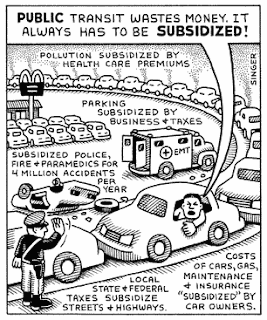~ Think government is too big and spends too much money? You can write your legislator, sure. But if you have your own business, you could also take direct action to help the budget: leave your car in the garage and take the bus.
I'm a consultant. I help inventors, first-time entrepreneurs and fledgling small businesses turn their ideas into revenue and profits. I work for myself, and when it's time to do my federal income taxes on Form 1040, I must attach Schedule C, Profit or Loss from Business. This is the form where I summarize my business income and expenses and report my gain (yeah!) or loss (ugh!)
I take public transit as much as I can, and I am a regular user of Seattle Metro, Sound Transit and whatever agency serves where I'm going. Because I am often doing so as part of my business, I keep careful records of when, where, whom and what.
Doing my taxes last month (because I always extend my filing from April to October) I was working though the gory detail of Schedule C. It's not one of the worst forms in the IRS demonicon, but it is still several hours of work to do right, mostly because every conceivable expense one might incur in the business has an intricate hierarchy of highly specific rules.
Office expenses? Check. Meals and entertainment? Check. Car and truck expenses... travel expenses... Hmm. Now it gets interesting for those of us who support public transit, want to reduce our carbon footprint, and so on. Car and Truck expenses on line 9 are easy:
You can deduct the actual expenses of operating your car or truck [for your business] or take the standard mileage rate.Period. How easy is that? Now, here are the instructions for line 24a, Travel:
Enter your expenses for lodging and transportation [of whatever kind] connected with overnight travel for business while away from your tax home.There's a ton of logorrheal filigree on every nuance in Publication 463 for those with a thirst for dry detail, but the gist is that generally travel (by whatever means) is deductible if you go on a business trip long enough that it requires some period of sleep to properly do the job. OK, I can deduct my airfare, my rental car (if I ever used one) and the bus/train fare between home/airport/hotel/client. Great.
If I drive my car to a client in the morning and return home later that day, I can deduct the actual or standard mileage rate for the car, as well as parking and tolls. However, if I drive to the park and ride and take the bus I can still deduct the miles I put on my car, but not the bus fare.
The tax code subsidizes my driving, encouraging me to pollute, congest the roads, and compete for scarce and ever-costlier parking. If I take the bus, alleviate traffic, reduce my emissions impacts, etc. I pay for that solo; no deduction against my consulting income.
How big is my driving subsidy? Let's do a little math.
While I take public transit 3 miles into downtown Bellevue (3+ miles by car), and to the airport (~18 miles) and many other places, I mostly go to downtown Seattle (12.5 miles +/-). So on average, were I to drive, I'd be doing 25 miles per day, assuming just there-and-back travel. (In reality, there's probably several more miles involved because I generally visit more than one client, and I bunch them together to minimize travel.) Last year, Uncle Sam provided a deduction of 51 cents per mile, so, assuming a basic 25 miles per day, and 4 days per week (typically) I yield a car deduction of $51 per week. Over a year this readily exceeds $2,000. More if you add in the parking and the trips between clients. Nice!
Now let's compare to public transit. Assuming for all those same trips I take public transit and drive my car only to and from the park-and-ride (2.8 miles), and on the same schedule weekly and over the year, my tax deduction would be maybe $500. Not bad. But I'm also spending on bus fare. That varies by time of day and which bus, but at most it's $3.00 each way, or $6.00 round trip. Total: a bit more than $1,000 per year. Deduction on my taxes? $0.00. Zero. Nada. Zilch.
It's still cheaper to ride the bus than to drive, but the tax code strives to narrow the gap by making car driving effectively cheaper. I am at a loss to explain why this makes any kind of policy sense.
Why doesn't the tax code give a deduction for bus fare? It would save the government money to the extent that people traded car travel for public transit. Every person who took public transit would cost the government less because the deduction would be less compared to that of driving that same trip. The savings would be per trip, too. People wouldn't need to go all in on the bus, for every trip would help.
Every time we took public transit for business, apart from all the other benefits, we'd reduce our cost of government.
Cross-posted to Chris B. Leyerle blog

Very powerful. Every time we use or fund public transit it is win, win.
ReplyDeleteThanks! Hope to post something every 2-3 weeks as my (largely non-existent) free time allows...
ReplyDelete